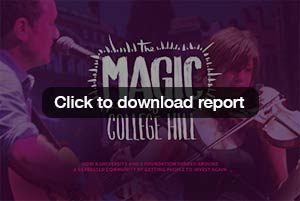MACON – A new report provides lessons on building successful cities, highlighting the experiences of the once-blighted College Hill neighborhood in Macon. An initiative of the John S. and James L. Knight Foundation, the report – “The Magic of College Hill” – outlines the factors that contributed to the renewed vibrancy of the area that connects Mercer University with downtown. It tracks the work of Knight Foundation, the College Hill Alliance, the Community Foundation of Central Georgia, Mercer, developers and residents, allowing a window into a collaborative approach to city revitalization.
Once a center for textile commerce and cultural activity, Macon, like many American cities, has had to tackle deep economic setbacks, leading to depleted incomes, high crime rates and neighborhood blight. Prior to 2007, these challenges were reflected in Macon's depressed College Hill, a collection of historic neighborhoods that flow between Mercer and downtown.
Over the last seven years, however, through the help of strong public-private sector partnerships, the neighborhood has experienced a renaissance, attracting new residents and becoming an energetic hub for arts, culture, education and history. It has also become an example in civic action, mobilizing previously disengaged residents to contribute to the city's success. College Hill redevelopment efforts have resulted in wide acclaim for Macon and attracted nearly $100 million in private investment since 2007.
“The spirit of belonging and vibrancy now alive in Macon reveals the power of effective collaboration; it is an example for communities that are struggling with economic and social challenges too large to be tackled by a single public or private solution,” said Beverly Blake, Knight Foundation program director for Macon. “Cities can learn from both the achievements and the setbacks of the College Hill neighborhood and move closer to developing their own formula for success.”
In 2013, the College Hill redevelopment plan won global attention, receiving a Gold Award for Redevelopment and Reuse and a Silver Award for Neighborhood Development Initiatives from the International Economic Development Council. Growing recognition for Macon's efforts gave rise to “The Magic of College Hill.” The report highlights lessons for cities facing similar challenges and outlines 11 drivers of city success including:
Leverage existing assets: College Hill redevelopment efforts relied on Macon's rich history and strong local partners.
Start small; show impact: The neighborhood is 2 square miles with 4,300 residents; it proved ideal as a testing ground for wider city revitalization.
Draw up a master plan: A strategy shaped by the community helped Macon focus the rollout of the redevelopment.
Create an organization to champion the effort: The College Hill Alliance, established to propel redevelopment and attract talent, provided a strong anchor for the plan.
University partners play a pivotal role: Mercer shared common goals with other partners to grow its student body and propel the city's success.
Foundations must act as an accelerator: Knight Foundation acted as both a community funder and connector to nurture revitalization efforts.
Government must be involved, even if it does not invest: Local government in Macon paved a path for attracting private capital and grassroots volunteerism.
Private investment will make or break a project: The entrance of small businesses, followed by a prominent developer to the neighborhood helped build momentum.
Encourage new ideas and participation with competitions: The Knight Neighborhood Challenge, which engaged residents in the community transformation, awarded almost $3 million and generated an economic impact of over $9 million.
Capitalize on the energy of newcomers: University students new to Macon helped recognize the city's potential for innovation.
Communicate effectively to bring the vision to life: The College Hill Alliance and other partners were encouraged to communicate openly and often to drive community trust.
Macon Bibb-County, however, is about evenly split between white and African-American residents, and a challenge is to involve more of Macon's African-American residents in the revitalization of the broader area, which still suffers from persistent problems such as blight. The report focuses on the ongoing turnaround of the Beall's Hill neighborhood as a potential model.
To download the report, visit: www.KnightFoundation.org/maconmagic. Follow @KnightFdn on Twitter for updates.
About the John S. and James L. Knight Foundation
Knight Foundation supports transformational ideas that promote quality journalism, advance media innovation, engage communities and foster the arts. We believe that democracy thrives when people and communities are informed and engaged. For more, visit KnightFoundation.org.









